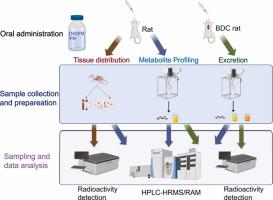Journal of Pharmaceutical and Biomedical Analysis ( IF 3.1 ) Pub Date : 2024-01-15 , DOI: 10.1016/j.jpba.2024.115984 Ziyan Ma 1 , Minghai Tang 2 , Lijuan Chen 1

|
Flonoltinib Maleate (FM) is a dual-target inhibitor that selectively suppresses Janus kinase 2/FMS-like tyrosine kinase 3 (JAK2/FLT3), which is currently in phase I/IIa clinical trial in China for the treatment of myeloproliferative neoplasms (MPNs). In this research, we used [14C]-labeled FM (14C-FM) to investigate the distribution, metabolism, and excretion of FM in rats using High-Performance Liquid Chromatography coupled with High-Resolution Mass Spectrometry/Radioactivity Monitoring (HPLC-HRMS/RAM) and liquid scintillation counter. The results revealed that FM displayed widespread distribution in rats. Furthermore, FM demonstrated rapid clearance without any observed risk of organ toxicity attributed to accumulation. Profiling of FM metabolites in rat plasma, feces, urine, and bile identified a total of 17 distinct metabolites, comprising 7 phase I metabolites and 10 phase II metabolites. The major metabolic reactions involved oxygenation, dealkylation, methylation, sulfation, glucuronidation and glutathione conjugation. Based on these findings, a putative metabolic pathway of FM in rats was proposed. The overall recovery rate in the excretion experiment ranged from 93.04 % to 94.74 %. The results indicated that FM undergoes extensive hepatic metabolism in SD rats, with the majority being excreted through bile as metabolites and ultimately eliminated via feces. A minor fraction of FM (<10 %) was excreted through renal excretion in the form of urine. Integration of the current results with previous pharmacokinetic investigations of FM in rats and dogs enables a comprehensive elucidation of the in vivo ADME processes and characteristics of FM, thereby establishing a solid foundation for subsequent clinical investigations of FM.


















































 京公网安备 11010802027423号
京公网安备 11010802027423号